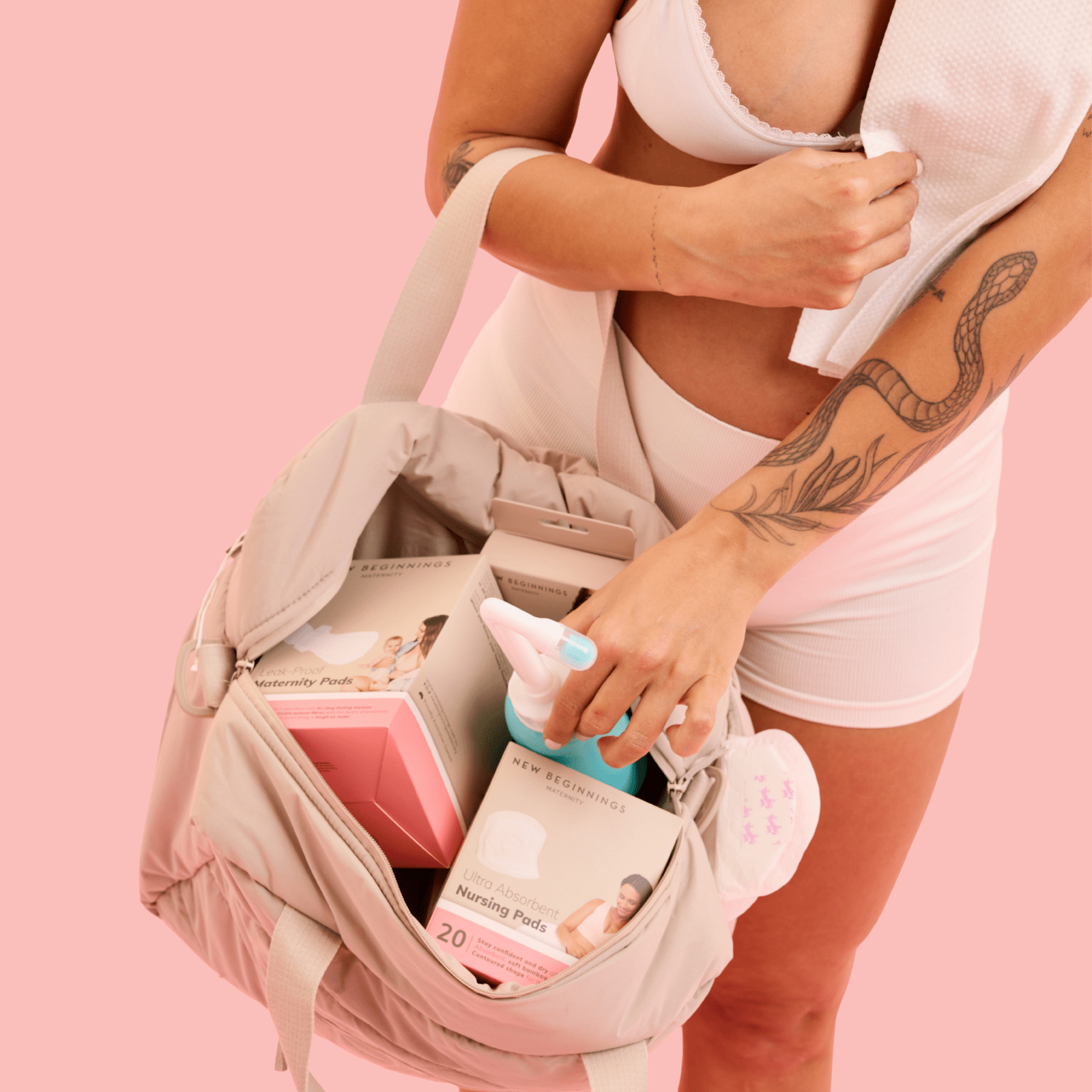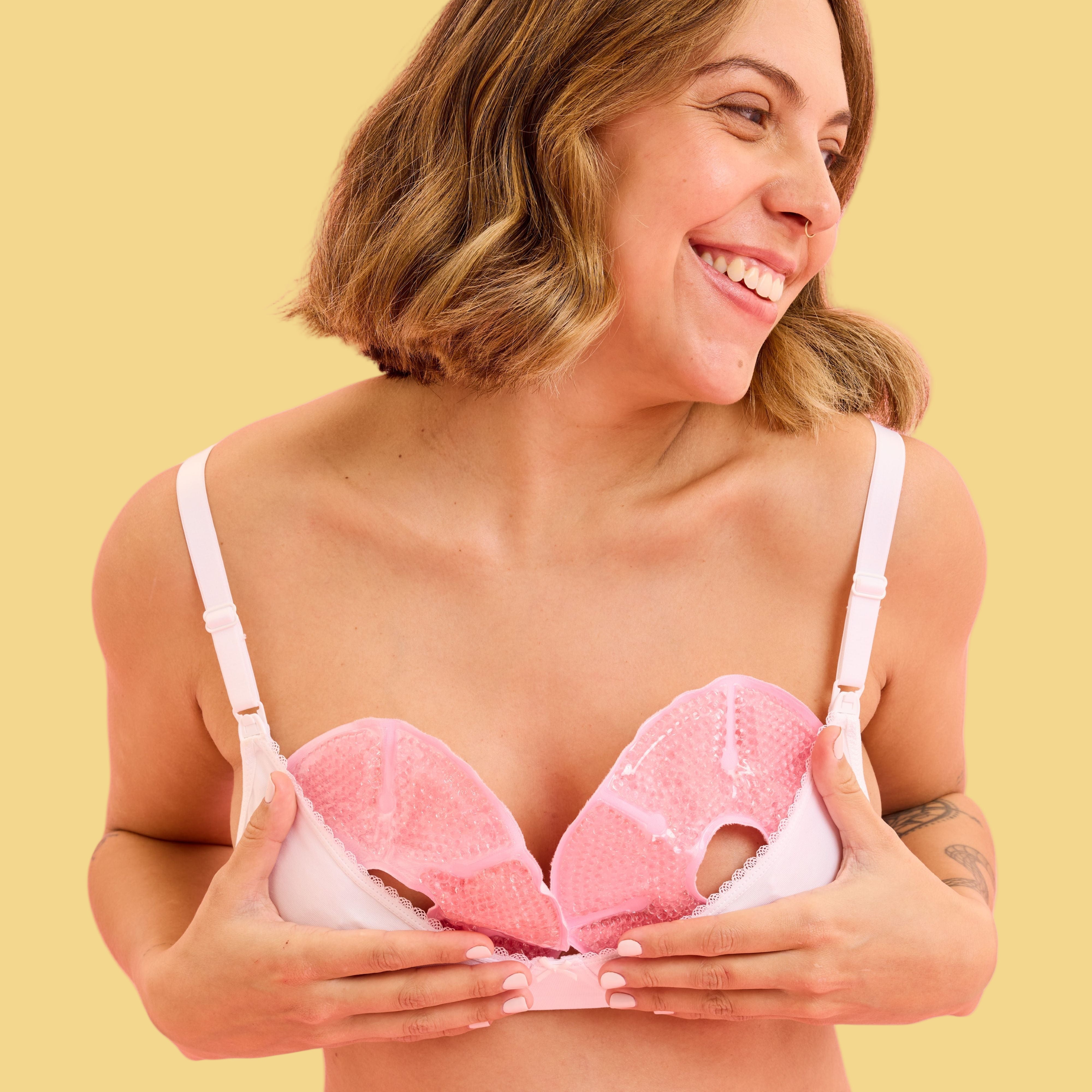Maternity Blog & News | New Beginnings
My Brush with Mastitis (and my top tips on how to avoid it)
Think you might have mastitis? Don't suffer in silence! Learn about the symptoms, treatment & prevention tips. Plus, get the lowdown breastfeeding essentials for mamas on-the-go!
Learn moreSterilisation On-the-Go: Simplifying Parenthood with Our Portable UV Sterilisers
Introducing your new baby to the world marks a vital stage in your child’s development. During family outings, your curious little bub is eager to touch and taste everything around them—a healthy form of discovery which shows their advancing physical and cognitive development. However, this curiosity often results in dummies, sippy cups, and bottles being dropped on the floor during your daily stroll. Cleaning these essentials before handing them back to your baby can be challenging while on-the-move, but fear not! With New Beginnings' Portable UV Sterilisers, your outside adventures will no longer be a hassle, ensuring your baby is free from any germs or nasty bacteria. Why should I try UV Sterilisation? To keep nasty tummy bugs at bay, it is crucial to keep your baby's accessories clean, especially during the first 12 months when their immune system is still developing. UV sterilisation is a highly effective method and kills 99% of germs, mould, viruses and bacteria, making it a highly efficient way of keeping your little ones out of harm’s way. Unlike chemical-based methods, UV sterilisation is chemical-free and doesn't leave behind any residue, ensuring your baby's accessories are safe for immediate use. Widely used by healthcare professionals such as doctors and surgeons, UV sterilisation is an affordable approach to cleaning you can trust. Exploring the Portable 4-in-1 UV Steriliser & Portable Mini Steriliser Packing a bag before leaving the house can be difficult when your new bub comes along. You remember when the only staple items required for the day ahead were keys, phone, and purse or wallet. Nowadays, that seems to have quadrupled. You’ll need a bag big enough to carry nappies, hand sanitiser, wipes, change pads, sun cream, formula bottles, a change of clothes for all weather conditions – the list goes on. However, a portable steriliser is one thing that is worth adding to your list. Compact and lightweight, our Portable Mini Steriliser is a handy little gadget that fits perfectly into any backpack or sling purse, ready to keep you prepared for when your baby inevitably throws their dummy into the abyss. With a simple open/close cover, this portable gadget allows you to stay focused on bub while popping their dummies into the compartment. After 6-8 minutes, the sterilisation is complete. If time-saving is what you require, especially if you're juggling the care of two or three little ones, why not try our Portable 4-in-1 Steriliser? With a much quicker 3-minute sterilising cycle, this steriliser offers a swift solution to meet the needs of busy parents. Along with its fast completion time, the 4-in-1 device has been designed to operate in complete silence, which is ideal for when you’re on a day out and bub has finally drifted off to sleep. Both the Portable 4-in-1 Steriliser and the Portable Mini Steriliser, have been crafted with you in mind, mum! As parents, we know how important time-saving devices are, especially when our days are filled with baby duties. Made with an automatic switch off feature, our UV sterilisers power off once their cycle has completed to save battery usage and prevent overexposure to chemicals so that bub’s accessories are clean and ready to go once again! What are parents saying about our UV sterilisers? "I was lucky enough to be chosen to trial and review the New Beginnings Portable Mini UV Steriliser. It's such a handy portable device, I honestly don't know how I lived without it until now! Amazing for when you're out and about! Gives you the peace of mind you need that anything you drop onto the ground etc can be quickly and easily sterilised and is safe again to use. What a great invention!" - mom358118 Want to find even more sterilisation options for you and bub? Take a look and discover the full New Beginnings’ Steriliser range! From Microwavable Steriliser Bags to our 2-in-1 UV Steriliser & Dryer, this range offers easy and hygienic solutions for cleaning to ensure the well-being of your little one. Not to mention, all of our sterilisers come with a 12-month warranty – what more can you ask for?!
Learn moreUnveiling the Top Breast Questions Asked During and After Breastfeeding
It's common to have questions about what's happening to your breasts during and after breastfeeding and we are here to help answer those questions. We answer the burning questions here.
Learn moreBreastfeeding in Summer: A Guide to Keeping Mum and Bub Cool and Hydrated
The summer heat poses unique challenges for breastfeeding mothers, requiring careful management to ensure adequate hydration and comfort for both mumma and bub. In these warmer months, maintaining sufficient hydration is essential, impacting milk production and overall maternal well-being.
Learn moreBreastfeeding Tips for New Mums: Your Guide To Breastfeeding Newborns
To help new mums along their breastfeeding journey, we've answered a list of the most common questions we hear around breastfeeding newborns and how to establish good feeding habits.
Learn moreOpen vs. Closed System Breast Pumps: Key Differences You Need to Know for Successful Pumping
If you're thinking about buying or renting a breast pump and have been doing your research, you may have seen some models described as ‘closed system’ and others as ‘open system’. But what do these descriptions actually mean? And why do they matter? Read on to find out…
Learn moreHow to prepare for breastfeeding
As your pregnancy journey nears its beautiful finale, getting ready to nourish your little one through breastfeeding is a wonderful step. Here's your guide on how to prepare for breastfeeding.
Learn moreBreastfeeding Myths vs. Facts: Your questions answered
World Breastfeeding Week (Aug 1-7) is just around the corner, a global awareness campaign which reminds us that we all have a role to play in protecting, promoting, and supporting breastfeeding. This year, #WBW2023 is focused on creating breastfeeding-friendly workplaces, and highlighting the importance of paid leave and workplace support for new parents. If you’re an expecting mum, the whole idea of breastfeeding might seem daunting. Especially with a sea of misinformation out there - from your friend that swears your small boobs won't make enough milk to the well-meaning ladies at the supermarket who insist exercise makes your milk sour (what the…?) In celebration of WBW, we’ve separated the old wives' tales from the science to give your bub (and boobs) the best start. Myth: Breastfeeding is easy Those mamas on Instagram make it look so easy – but unfortunately, low or oversupply, cracked nipples, and mastitis are common challenges on the breastfeeding journey. Be prepared with New Beginnings Nipple Shields at the ready, to help with latching and inverted nipples making for a pain-free breastfeeding experience. And if that doesn’t work out? Fed is best, always. If you’re ever feeling overwhelmed, you can contact the Australian Breastfeeding Association Helpline for guidance and support. Fact: Most babies naturally know how to feed Newborn babies have a natural sucking reflex that helps them find the nipple and latch, literally seconds after birth. It's incredible how their little instincts kick in! Myth: You can’t use formula if you want to breastfeed Are you desperate to give your nips a breather, but have heard mixing feeds might cause your baby to go off the boob altogether? Although “nipple confusion” is possible, bub will likely be fine to switch between the two. Opting for a bottle with a slow-flowing teat, taking frequent breaks during feeding, and holding the bottle at a slight angle instead of straight up (so they have to work for it a little) are all great options to help minimise the likelihood of any issues with this transition. Fact: Breast Milk is the perfect food Even better than a superfood smoothie, your homegrown milk is packed with all the essential nutrients, enzymes and hormones your baby needs to thrive. (But don’t feel bad if you go for formula – it’s still a healthy choice with loads of goodness). Myth: You can’t breastfeed if you’re sick You might feel rubbish, but it’s perfectly safe to continue feeding through common illnesses, like the cold, flu, or stomach bug. Just make sure to flag it with your doctor or pharmacist that you’re feeding if you need some meds. Fact: Breastfeeding can keep your baby healthy Breast Milk is an antibody powerhouse, helping boost your baby's immune system and stave off infections, allergies and illnesses. Even more impressive, the exact cocktail is tailored to your exposure to pathogens in your environment, giving your bub protection to what it needs most. Myth: Exercise will make your milk sour There’s zero evidence for this one – so go forth and sweat it out (provided you’ve got your doctor's okay). Fact: There are health benefits for you, too Bonus: breastfeeding can reduce your risk of breast and ovarian cancer, type 2 diabetes, and high blood pressure. Plus, it burns around 500 calories daily. Myth: Breastfeeding makes your boobs sag Nope – it's actually pregnancy that causes changes in size and shape, with factors like multiple pregnancies, pre-pregnancy bra size, and even smoking coming into play. Your boobs may feel a little deflated right after you stop breastfeeding, but in the following months, fatty tissue will gradually replace the milk-producing tissue and pump them back up. Fact: Size doesn’t matter Whether you have big boobs or are a card-carrying member of the itty bitty titty committee, your body will likely produce precisely what your little one needs. It’s all down to your hormonal signals and the demand from your baby (more feeds = more milk) that influence milk production. Need some help on your breastfeeding journey? Our New Beginnings breastfeeding collection has got you covered, from Aqua Gel Breast Pads to help cool sore nipples to Hot and Cold Packs to soothe mastitis. If you’re finding yourself Googling everything from boobs and bums to bubs and bibs, our other blogs offer more tips for navigating this new chapter of your life - mummahood. More Truths & Tips Breastfeeding 101: Understanding Newborn Feeding Habits What Should I Do If Breastfeeding Is Painful? 10 Tips for a Pain-Free Breastfeeding Experience
Learn moreBreast Pumps: Comparing the New Beginnings Breast Pumps
To help you choose the best breast pump for your needs, we've created a comparison table.
Learn more













